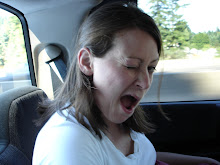I have decided that the best way to personally analyze the novel as a whole is to take a final exam on it. So I have taken the liberty of writing one for myself.
1. "They" say this is a coming of age novel. Do you agree? And if so, what is the turning point for Holden?
I do see Catcher as a coming of age novel. Throughout the account, Holden proves himself to be completely self-centered and adolescent--thinking only of his own needs and desires. He hints at things he likes (his brother Allie, his sister Pheobe, the ducks in the lake...), but focuses primarily on his dislikes (Hollywood, fancy prep schools, anyone who is a big phoney, which is pretty much everyone he meets). This is a very adolescent attitude--I see teenagers everyday who are consumed by the negative aspects of life--which teacher is a jerk, whose shoes are ugly, why do we have to write? can't we just do nothing? this class is so boring! They are incapable of seeing the world beyond themselves, of noticing when people are hurting, how their words affect others, or what would be the consequence of hard work. Holden too wants life to be easy. He doesn't want to have to deal with others, to work at relationships. He'd rather go and live in a cabin in the woods and pretend to be a deaf-mute so that no one will talk to him. It is ridiculous and immature for one to think that he could go through life without dealing with people who he doesn't like. But Holden does grow up. He does look beyond his own nose. I think that the turning point in the novel comes when Holden meets Pheobe at the musem, after asking her to come and say goodbye to him. He expects her to come and maybe to be sad, but she shows up with a suitcase wanting to go with him out west. Holden is beside himself, it is as if he realizes for the first time that Pheobe looks up to him and wants to follow in his footsteps. This makes Holden go crazy--he doesn't want her to look up to him, he feels worthless. It is like this conversation with Pheobe triggers something in him, and he starts to think about the consequences of his actions, about how he affects others. I guess you could say that Pheobe saves him in a way.
2. How do you see yourself in Holden? What lessons helped you to come of age?
Oohh, big question. And quite personal too. How presumtuous of you to ask. Well, first off, I, like Holden, am still very selfish. I'm reminded of this daily when faced with some ungodly task of motherhood. I have also always been a dreamer. Big, crazy dreams about living in faraway lands and being a writer. (Holden's dreams are about living in the woods and being a hermit) I've lived in my head most of my life. I think one of my turning points was when I lived in Costa Rica for six months, my junior year of college. It is a beautiful country with big, wide-open spaces. I still didn't finish my "book". It was also gross, big bugs everywhere. I stopped eating meat and longed for my mother's living room. I, in fact, love America. It is a wonderful free society and I am ever thankful that I was born here. (That is potentially an ethnocentric statement, but damn it, it is true). Another turning point came in my life when I graduated from college and couldn't get a job with my English degree. (!) What a shock! (!) I applied for tons of publishing and editing jobs in New York, Los Angeles, and London. Never heard back from any of them. The clencher was when I applied for a job at the Skagit Valley Herald (Mount Vernon's tiny newspaper) as some sort of advertising representative. I did have an interview for this one, but I was passed up for a more experienced candidate. Really? It doesn't get much more humiliating than that. At this point I realized that my dreams might just possibly need some adjustments. I went back to grad school and got my teaching degree. You know what they say--"those that can't--teach!"
3. Sum it up--what are your thoughts on the ending?
I appreciated that the story came full circle. Clearly Holden is in some sort of mental institution or rehab center. I think it is a mark of his newly-found maturity that he can reflect upon his journey and share his story. He is starting to reconnect with humanity--he even misses old Stradlater! "Don't ever tell anybody anything. If you do, you start missing everybody."
Tuesday, June 17, 2008
Subscribe to:
Post Comments (Atom)

0 comments:
Post a Comment